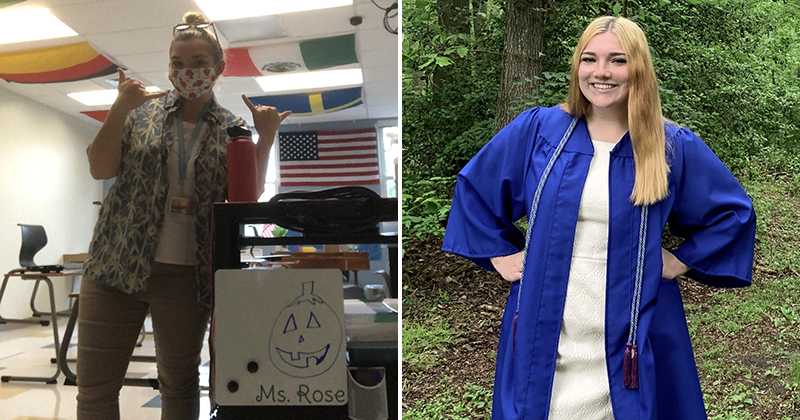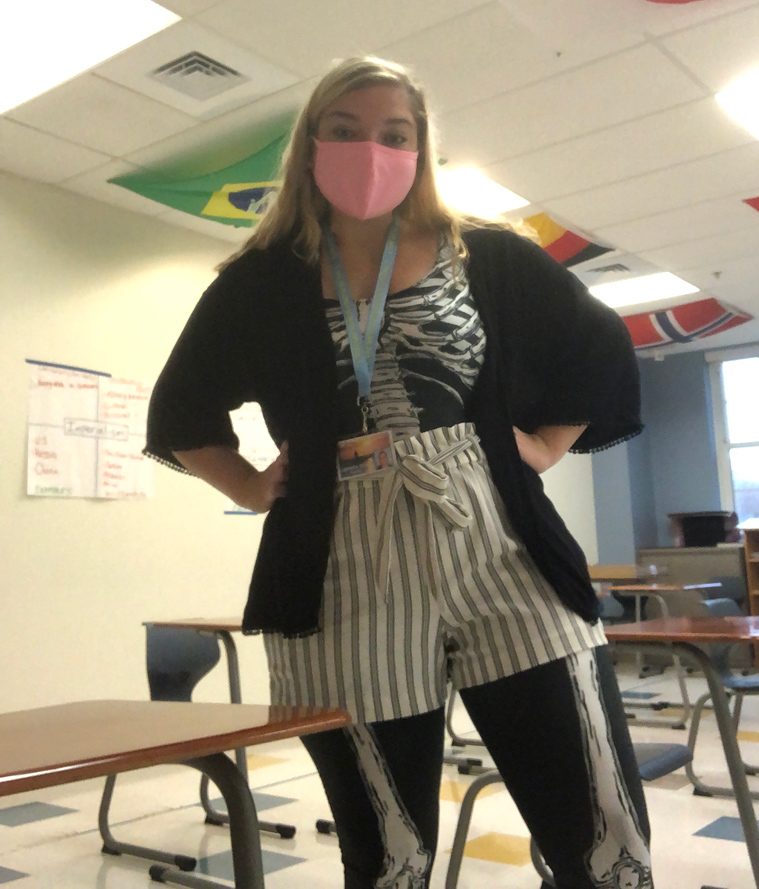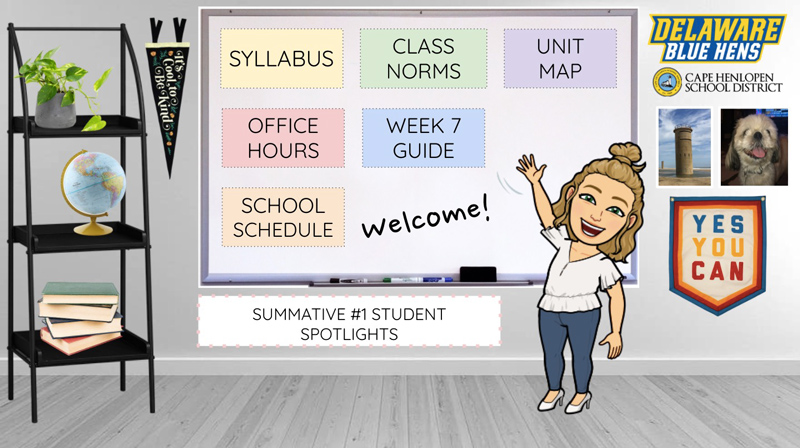


A class of her own
Photos courtesy of Amanda Rose February 10, 2021
Path to teaching at alma mater began at UD’s Georgetown campus
As Amanda Rose walked across the stage at her graduation ceremony at Cape Henlopen High School in Lewes, Delaware, in the spring of 2015, she had no idea that the teachers who were cheering her on from the stage would be her colleagues just five years later.
Like many college freshmen, Rose hadn’t yet decided on a career path when she enrolled at the University of Delaware’s Georgetown campus as an Associate in Arts Program (AAP) student in the fall of 2015. However, she had a broad range of classes from which to choose, and that eventually helped her narrow down her options.
“The Associate in Arts Program allowed me to explore my interests for my first two years of college,” she said. “It was an amazing opportunity for me to take many different classes and really discover for myself what I wanted to do as a career. The professors were passionate about their content, which inspired me to find my passion as well. As someone who entered the program undecided, that was exactly what I needed.”
Rose soon realized that she could combine her lifelong love of history with the opportunity to make a positive change in students’ lives, just as her own teachers at Cape had done for her.
“The prospect of a career where I could really make a difference in the lives of young people is what finally made me realize that teaching was what I needed to do,” she said.

Due to the AAP’s small class sizes — program-wide, all AAP classes are capped at 35 seats — students are able to form closer bonds with both their professors and their classmates than they might otherwise. This is especially true for AAP education students, who follow the same course progression and tend to take many of the same classes together. With the advent of COVID-19, Rose said, she and her classmates depended on each other more than ever.
“We were a very tight-knit group to begin with, but the collective challenges we faced last spring brought our bond even closer,” she said. “We were faced with finishing our student teaching during a pandemic, and we all managed to do it together. We taught each other on Zoom, shared ideas and shared our struggles together.
"The fact that we all made it work, finished teaching the students in our placements remotely and graduated on time was extremely inspiring.”
Rose excelled academically during her time at UD. She was awarded the Highest GPA honor at her AAP Convocation ceremony in 2017 and received three major awards from the University when she graduated with her bachelor’s degree in spring 2020: the Center for Secondary Education’s Outstanding Student Teacher Award; the Eve Holst Clift Award, which is given to a graduating history major for outstanding academic performance; and the Alumni Undergraduate Award for History/Social Studies Education, which is awarded for excellence in student teaching.
Rose began teaching 11th-grade American history at her alma mater, Cape Henlopen High School, in August 2020. As a very recent college graduate, however, she faced the same classroom-management challenge that many young educators encounter when they begin their careers: How do you exert authority when you are only a few years older than your students?
“Being a young teacher in a high school was initially a worry of mine, but it has actually proved to work to my advantage,” Rose said. “My students have been able to connect with me knowing that I have, quite literally, sat in their seat before, and not very long ago. I hope that seeing someone my age in the building is inspiring for my students as they begin their journey into college and their future careers.”
Rose also discovered an informal benefit to the narrow age gap between herself and her students: “I still understand all the memes, social media references and slang terms they use,” she said, laughing.
In addition to the issues that all new teachers face as they work to find their footing in the classroom, Rose faced a unique challenge as she began her career: teaching during a global pandemic. During the fall 2020 semester, she taught two cohorts of students in person on Monday, Tuesday, Thursday and Friday, while Wednesday classes were taught remotely via Zoom.
“The pandemic has really impacted the way that my teaching looks,” she said. “I have had to modify every lesson plan I have to suit the needs of hybrid and remote learners at my school. This has involved more time on the computer than I could have ever anticipated. While I was familiar with [the learning-management application] Schoology, Google Docs and many other tech tools before, this year has really forced me to expand my knowledge even further and get creative with instruction.”

As such a recent college graduate, Rose was proficient with cutting-edge educational and collaborative-learning technology. When the Cape faculty were suddenly confronted with pandemic-related instruction and communication challenges, this aptitude made her a valuable asset to her fellow teachers.
“I have been able to help many of the veteran teachers in my building with technology, which has been a great experience for me as a first-year teacher,” she said. “This has shown me that even as a brand-new teacher, I have many valuable skills to bring to my school and share with others. Most recently, I was able to share my ‘Virtual Classroom’ during a professional development course with the other teachers in my building.”
The pandemic presented a host of challenges unrelated to technology, however, and Rose said she discovered that she would also need to change certain aspects of her teaching style.
“Wearing a mask has been a tough transition for me, as I am someone who smiles and relies heavily on my facial expressions while teaching,” she said. “I have had to modify instruction to fit my smaller, in-person classes, which has been difficult. I love having students work together, but I have had to reimagine what that looks like with smaller groups and social distancing guidelines.”
Rose credits her colleagues at Cape for helping her to successfully navigate her inaugural year.
“As a first-year teacher, I am extremely fortunate to have a strong support system in my school,” she said. “My administration is very supportive, and I felt so welcomed in my first few weeks. Similarly, my Social Studies Department is full of wonderful, experienced teachers who are always there for me when I have questions, need advice or need a good laugh.”
Was it daunting to join her former teachers as their new colleague? Yes and no, Rose said. “There are a few teachers that I had in high school who have helped me,” she said. “It has been such a surreal experience to be teaching in the same building as many of the amazing people who inspired me to pursue teaching as a career.
“Returning to my old high school as a teacher, I feel beyond fortunate to give back to the community I have lived in almost my whole life.”
Contact Us
Have a UDaily story idea?
Contact us at ocm@udel.edu
Members of the press
Contact us at 302-831-NEWS or visit the Media Relations website

